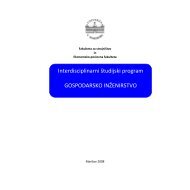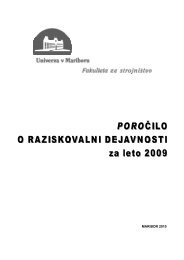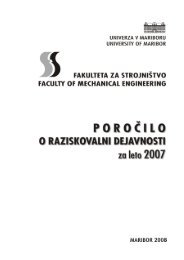University of Maribor version 01 22.4.2009 - Fakulteta za strojništvo ...
University of Maribor version 01 22.4.2009 - Fakulteta za strojništvo ...
University of Maribor version 01 22.4.2009 - Fakulteta za strojništvo ...
Create successful ePaper yourself
Turn your PDF publications into a flip-book with our unique Google optimized e-Paper software.
Information Package on the degree programmes <strong>of</strong> the Faculty <strong>of</strong> Mechanical Engineering <strong>Maribor</strong> Part TWO Page 22<br />
The Joint courses program is designed in the sense <strong>of</strong> vertical and horizontal connectivity. The theoretical natural science<br />
courses are followed by the basic theoretical engineering courses, and later by the specialised textile engineering and other<br />
courses. The second part <strong>of</strong> the study – module courses, also allows horizontal connections between different study programme<br />
modules, since the student may form the curriculum by choosing the defined number <strong>of</strong> optional courses within the programme<br />
module or by choosing courses from other modules or programmes.<br />
The Joint courses are compulsory for all Textile Engineering study programme students. Their aim is to build on student’s existing<br />
knowledge <strong>of</strong> engineering science and to provide a solid base <strong>of</strong> textile engineering. Join courses start with the basic theoretical<br />
natural sciences courses and are followed by detailed studies <strong>of</strong> the core textile engineering courses. Acquired fundamental<br />
knowledge <strong>of</strong> basic natural sciences contain all the components <strong>of</strong> the uniform theoretical education for technical branches <strong>of</strong> the<br />
pr<strong>of</strong>ession, and present the basis for detailed study <strong>of</strong> particular modules.<br />
The second part <strong>of</strong> the study <strong>of</strong>fers the students the opportunity to specialise in different textile engineering modules <strong>of</strong> their<br />
choice. Module courses deliver a specialised knowledge through a compulsory module course and a smaller number <strong>of</strong> optional<br />
courses, which can be chosen from a range <strong>of</strong> courses <strong>of</strong>fered.<br />
The following study modules are available:<br />
− Textile technology,<br />
− Eco-textile engineering,<br />
− Clothing engineering and<br />
− Engineering management.<br />
Each module has the structure <strong>of</strong> a compulsory module courses which provide the students with a comprehensive background <strong>of</strong><br />
the chosen field. The students are free to choose a defined number <strong>of</strong> optional courses from any other study programmes or<br />
modules in a particular study year. The students usually choose the optional courses after consulting their study mentor. The<br />
number <strong>of</strong> optional courses <strong>of</strong>fers a wide spectrum <strong>of</strong> additional knowledge to complement the compulsory courses.<br />
The last part <strong>of</strong> study, the Diploma work, is an individual project which is usually done within the subject areas that form a part <strong>of</strong><br />
the curricular requirements. The Diploma work can be devised by the student or chosen from a list provided by the lecturers. After<br />
completion <strong>of</strong> diploma work, the students are required to submit a diploma thesis and publicly present and defend its contents<br />
before an examination board. The Diploma work contributes significantly to the final student classification.<br />
The last three study modules, Eco-textile engineering, Clothing engineering and Engineering management have been introduced<br />
into the curriculum only recently. The new modules are intended to deliver a new breed <strong>of</strong> textile engineers with multi-disciplinary<br />
knowledge, which will fulfil the demands <strong>of</strong> modern industry in the 3rd millennium and assure new jobs to our graduates in the<br />
development, production, control and management <strong>of</strong> small, medium and large-size companies.<br />
The students also receive 2 months <strong>of</strong> pr<strong>of</strong>essional practical training, which is compulsory for advancement to the higher study<br />
year, 1 month after the 1st or the 2nd year <strong>of</strong> study, and 1 month <strong>of</strong> practical research training, which the student have to<br />
complete after the 4th year <strong>of</strong> study or at the latest before starting with Diploma work. The purpose <strong>of</strong> the pr<strong>of</strong>essional practical<br />
training is to enable the students to become aware <strong>of</strong> the environment in which they will work and the related problems. Research<br />
training is intended above all for developing an awareness <strong>of</strong> how to organise research and innovative work and organise the<br />
transfer <strong>of</strong> theoretical accomplishments into engineering practice.<br />
3.4 STUDY MODULES DESCRIPTION<br />
Eco-textile engineering<br />
This study module provides students with environmentally-minded knowledge <strong>of</strong> textile engineering. With broad awareness <strong>of</strong><br />
ecological problems in the world some applications in textile engineering are emphasised. The main emphasis <strong>of</strong> the study<br />
programme is on use <strong>of</strong> eco-friendly textile technology processes to reduce industrial waste and pollution. The students gain<br />
knowledge in the field <strong>of</strong> eco-finishing, dyeing, printing technologies and principles <strong>of</strong> wasterwater treatments. This study module<br />
introduces students into ecological and economic importance <strong>of</strong> textile material recycling. Erasmus students can choose courses<br />
from 5th semester upwards.<br />
<strong>University</strong> <strong>of</strong> <strong>Maribor</strong> <strong>version</strong> <strong>01</strong> <strong>22.4.2009</strong>





